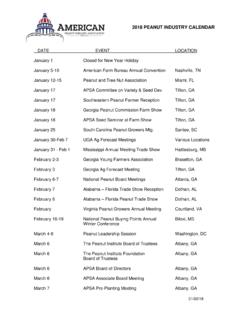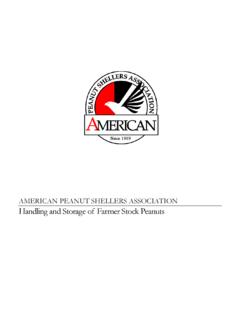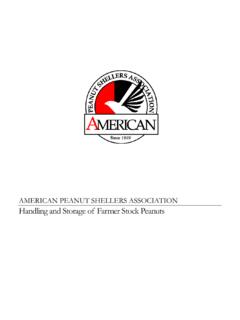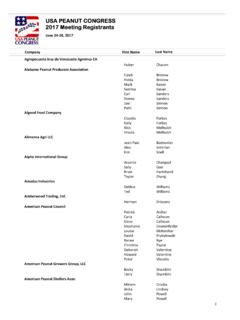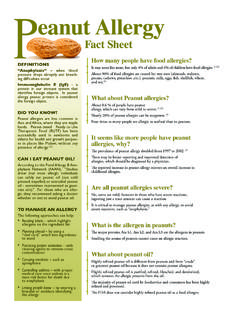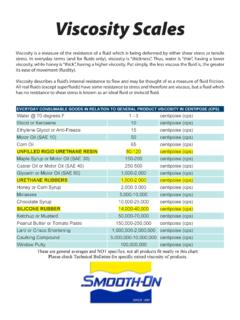Transcription of AMERICAN PEANUT SHELLERS ASSOCIATION
1 1 AMERICAN PEANUT SHELLERS ASSOCIATION Introduction Farmers Stock Trading Rules Shelled, Inshell Trading Rules Grade Standards Revised October 22, 2018 2 INTRODUCTION Formed in 1919, the AMERICAN PEANUT SHELLERS ASSOCIATION , Inc. ( APSA ) is the senior organized group in the AMERICAN PEANUT industry. It is a non-profit trade ASSOCIATION composed of commercial PEANUT shelling and crushing firms with operations in Alabama, Florida, and Georgia with provisions in the By-Laws for like firms in other southeastern states considered as part of the southeastern PEANUT production area to hold Active Memberships. Inasmuch as many of the transactions between Members of the ASSOCIATION , and between members and non-members thereof, are conducted by electronic communication, through brokers or otherwise, these Official Rules and Grade Standards, covering offers, sales and purchases of peanuts, are adopted and promulgated to facilitate trade, avoid misunderstandings and make more definite the terms of contracts of purchase and sale, avoiding the necessity of drafting in each instance a lengthy and cumbersome document.
2 Unless otherwise specified at time of sale, all peanuts or related by- products specified in and governed by these Rules and Grade Standards shall be of AMERICAN origin, and produced within the United States of America. Parties utilizing these Rules and Grade Standards in contractual matters should cite the applicable Rules or Grade Standards as follows: (1) If for Farmers Stock, "APSA Farmers Stock Trading Rules, (2) If for shelled, or inshell, "APSA Shelled, Inshell Trading Rules, (3) If for Grade Standards, "APSA Grade Standards . Unless otherwise specified by the contracting parties, citations to these rules and Grade Standards, shall be deemed to be the version posted on the APSA website on the date of the contract. 3 AMERICAN PEANUT SHELLERS ASSOCIATION Farmers Stock Trading Rules 4 F A R M E R S S T O C K T R A D I N G R U LE S T A B L E O F C O N T E N T S Article I General Rules.
3 5 Article II Standards .. 5 Article III Contracts .. 7 Article IV Weights .. 7 Article V Delivery .. 8 Article VI Sampling and Inspection .. 8 Article VII Rejections .. 9 Article VIII Arbitration .. 10 5 FARMERS STOCK TRADING RULES ARTICLE I. GENERAL RULES The following rules shall govern the purchase and sale of farmers stock peanuts in those transactions in which the Buyer and Seller agree in writing that the rules will apply. Farmers stock peanuts," shall be defined as defined in 7 Code of Federal Regulations Part 1446 as from time to time amended: "picked or threshed peanuts produced in the United States which have not been changed (except for removal of foreign material, loose shelled kernels, and excess moisture) from the condition in which picked or threshed peanuts are customarily marketed by producers, plus any loose shelled kernels that are removed from farmers stock peanuts before such farmers stock peanuts are marketed.
4 " RULE 1. The type, segregation, and, when applicable, the grade and/or classification of the farmers stock is to be specified at the time of the sale. Time of sale is defined as the time a contract is fully signed by all parties involved. RULE 2. All documentation necessary to accomplish the legal acquisition of farmers stock peanuts in accordance with all applicable governmental regulations shall be supplied by the Seller to the Buyer in a timely manner and in accordance with all regulations regarding the purchase or sale of farmers stock peanuts. ARTICLE II. STANDARDS RULE 3. All farmers stock covered by these rules shall be first classified in accordance with the standards of the United States Department of Agriculture (USDA) and the Federal State Inspection Service (FSIS). The classifications are as follows: Section 1. Segregation I. Farmers stock: Segregation I peanuts are farmers stock peanuts which are free from visible Aspergillus flavus mold and which: (1) Have at least 99 percent peanuts of one type; (2) Have not more than: (a) percent damaged kernels (rounded to nearest whole number); (b) percent concealed damage caused by rancidity, mold or decay; (c) percent freeze damage; (d) percent LSK's; and (3) Are free from any offensive odor.
5 Section 2. Segregation I farmers stock may be classed into A, B, or C classifications which are defined as follows: 6 Segregation I-A farmers stock shall have: (1) minimum sound mature kernels (SMK) (2) maximum sound splits (SS) (3) minimum total sound mature kernels (TSMK) (4) maximum other kernels (OK) (5) maximum damaged kernels based on the total sound mature kernel weight only (6) maximum foreign material (FM) (7) maximum loose shelled kernels (LSK) (8) minimum moisture (9) maximum moisture (10) No more than 2 parts per billion (PPB) aflatoxin based on testing the total kernel content, unless otherwise stated in the contract, using acceptable chemical testing procedures approved by the ASSOCIATION of Official Analytical Chemists (AOAC). Section 3. Segregation I-B farmers stock shall have: (1) minimum sound mature kernels (SMK) (2) maximum sound splits (SS) (3) minimum total sound mature kernels (TSMK) (4) maximum other kernels (OK) (5) maximum damaged kernels based on total sound mature kernel weight only (6) maximum foreign material (FM) (7) maximum loose shelled kernels (LSK) (8) minimum moisture (9) maximum moisture (10) No more than 15 parts per billion (PPB) aflatoxin based on testing the total kernel content, unless otherwise stated in the contract, using acceptable chemical testing procedures approved by the ASSOCIATION of Official Analytical Chemists (AOAC).
6 Section 4. Segregation I-C farmers stock shall be: Segregation I Peanuts that fail to meet Segregation I-A or I-B standards. RULE 4. Segregation II farmers stock: Segregation II peanuts are farmers stock peanuts which are free from visible Aspergillus flavus mold and which either: (1) have less than percent peanuts of one type; or (2) have more than: a. percent damaged kernels (rounded to the nearest whole number); or b. percent concealed damage caused by rancidity, mold, or decay; or c. percent freeze damage; or d. percent LSK's; or (3) have an offensive odor. 7 RULE 5. Segregation III farmers stock: Segregation III peanuts are farmers stock peanuts which have visible Aspergillus flavus mold. RULE 6. Other standards: All other standards relating to farmers stock peanuts that may pertain to seed, Commodity Credit Corporation loan, and the standards outlined in 7 CFR, Part 996 shall be in effect wherever and whenever necessary so as to comply with the respective agencies' requirements.
7 ARTICLE III. CONTRACTS RULE 7. Buyer and Seller may execute written contracts setting forth specific terms, standards, and conditions under which farmers stock peanuts are to be purchased/sold and received/delivered. Such written documents may be formulated by either the Buyer, the Seller, or by the USDA as appropriate. RULE 8. In the absence of mutual written agreement to the contrary by both Buyer and Seller, all terms and conditions of the original contract shall be fully adhered to in exact accordance with the language contained in the original contractual agreement. RULE 9. In the event that a contracting party enters into contractual agreements with multiple parties covering the same farmers stock peanuts, the contract first duly signed shall prevail over the other contracts, but the operation of this rule shall not diminish or excuse the contracting party from liability on those other contracts.
8 ARTICLE IV. WEIGHTS RULE 10. Upon delivery each truck or trailer of peanuts shall be weighed for actual gross and tare weight on scales with indicators capable of printing or imprinting multi-copy weight tickets. Scales and indicators must be approved by the appropriate state agency of weights and measures. RULE 11. Pre-determined tare weights or "split-axle" weights shall not be acceptable. When peanuts are delivered in trailers or vehicles having weight bearing tongues or hitches, such trailers or vehicles shall be completely disconnected and weighed separately. (Example: two wheel or tandem wheel PEANUT trailers) ARTICLE V. DELIVERY RULE 12. Section 1. Place of delivery is construed to mean the receiving location of the Buyer or its agent, which initially contracted with Seller. 8 Section 2. Time of delivery is construed to mean at time of harvest, which is defined as a point in time which occurs immediately after peanuts are picked or combined, unless otherwise stated in the contract.
9 RULE 13. When the Seller finds that he will not be able to complete a contract within the agreed limits, it shall be his duty at once to notify the Buyer by electronic communication. Then it shall be the duty of the Buyer within 24 hours to elect either to: (1) agree with the Seller to an extension or modifications of the contract; (2) after having given notice to the Seller to complete the contract, the Buyer, by the exercise of due diligence, will buy-in for the account of the Seller or; (3) after having given notice to the Seller to complete the contract, the Buyer will cancel the defaulted portion of the contract at fair market value that day, and any loss incurred to Buyer shall be chargeable to and the responsibility of the Seller. RULE 14. D E F I N I T I O N S 1. Notice or Notify as used in these rules shall mean oral communication and when possible by electronic communication. 2. Buy-in in these rules shall mean an actual purchase of peanuts of like kind on the open market.
10 ARTICLE VI. SAMPLING AND INSPECTION RULE 15. Sampling and inspection shall be performed in accordance with Federal or Federal State Inspection Service procedures as provided in the Code of Federal Regulations by an approved inspector. In determining segregation I-A, I-B, and I-C farmers stock, damage percentage shall be determined by dividing the weight of the damaged kernels removed from the total sound mature kernels by the weight of the total sound mature kernels, as determined by the inspection certificate. This percent shall be carried two (2) decimal places and not rounded to the nearest whole percentage point. The sample for aflatoxin shall be a sub-sample of the original sample. ARTICLE VII. REJECTIONS RULE 16. The results of sampling and inspections performed by Buyer's Quality Control personnel, or the Quality Control personnel of any other party processing, storing, or otherwise handling any given shipment, do not qualify as grounds for rejection of subject shipment.
